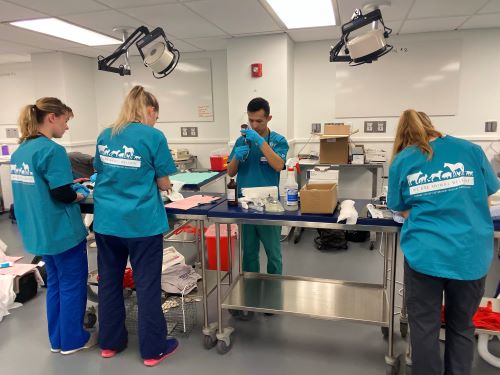World Spay Day Clinics Offer Care and CompassionMarch 20, 2020Heather Schrader, RVTProgram Manager, Student OutreachHSVMA was excited to support two World Spay Day clinics involving veterinary students this February. Every year HSVMA offers grants to clinics that provide spay/neuter services to the community and experience to students who will be offering these services after graduation.
The clinic in February was unique not only because it was held during February, which is Spay/Neuter Awareness month, but also because members of the UW Pre-Veterinary Association participated in the clinic, as well. These undergraduate students are considering a career in veterinary medicine, and this clinic was an opportunity to see what the job entails first-hand. Dr. Karen Hershberger-Braker, Faculty Advisor to the HSVMA Student Chapter at UW and Lecturer in the Departments of Comparative Biosciences and Pathobiological Sciences, said this of February’s clinic: “Madison Cat Project was very excited to expand the number of pre-veterinary students able to participate at our February 2020 spay/neuter clinic. We hope to inspire these students to include outreach spay/neuter in their upcoming veterinary careers.” Not only were there 9 pre-veterinary and 27 veterinary students participating at the clinic, there were also 4 veterinary technician students from Madison College caring for the patients. The two schools have been working together with Madison Cat Project to make these clinics successful for many years. Sixty-three community cats were altered during this clinic! These cats were lucky to receive such skilled care and their lives will be better because of it.
Every year we hear how much these World Spay Day clinics mean to our future veterinarians. HSVMA is dedicated to its continued support as they serve multiple purposes. They provide opportunities to show veterinary students how much their skills mean to the local population and the lives of their patients, whether they are living in a home or being cared for by members of the community. And they serve to educate students with needed medical skills and inspire them to become compassionate leaders and animal advocates. Caroline Warren, a student on the surgical recover team, said “Spay Day reaffirmed why I am here. On a day to day basis, I feel like I get bogged down in the little details of vet school. Participating in Spay Day was an incredible experience - I feel more in touch with my passion for shelter medicine that brought me to vet school in the first place.”
|

 HSVMA also supported a World Spay Day clinic for community cats at Cornell University College of Veterinary Medicine. Forty-four cats were sterilized with the guidance of faculty at the vet school and with participation from approximately 30 veterinary students. The students were able to hone their anesthesia and surgical skills in the operating room and exercise their communication skills with the community members who brought in the patients.
HSVMA also supported a World Spay Day clinic for community cats at Cornell University College of Veterinary Medicine. Forty-four cats were sterilized with the guidance of faculty at the vet school and with participation from approximately 30 veterinary students. The students were able to hone their anesthesia and surgical skills in the operating room and exercise their communication skills with the community members who brought in the patients.